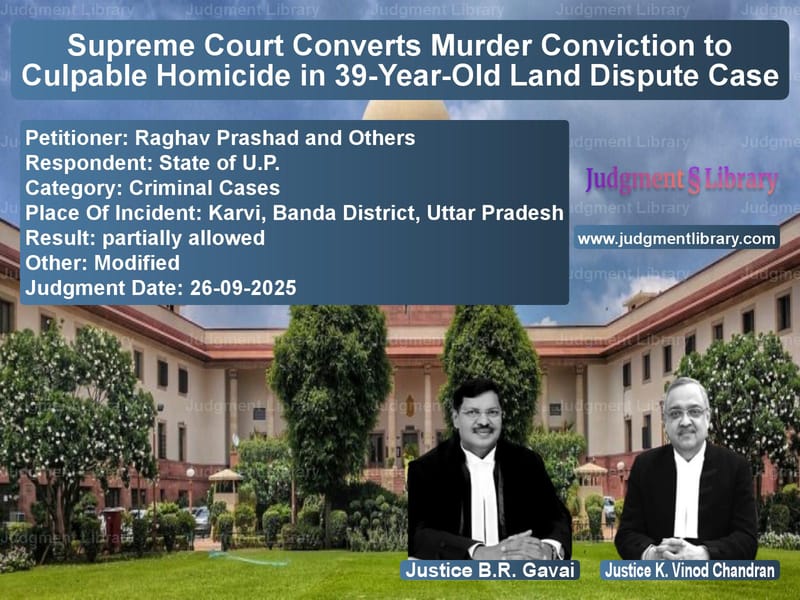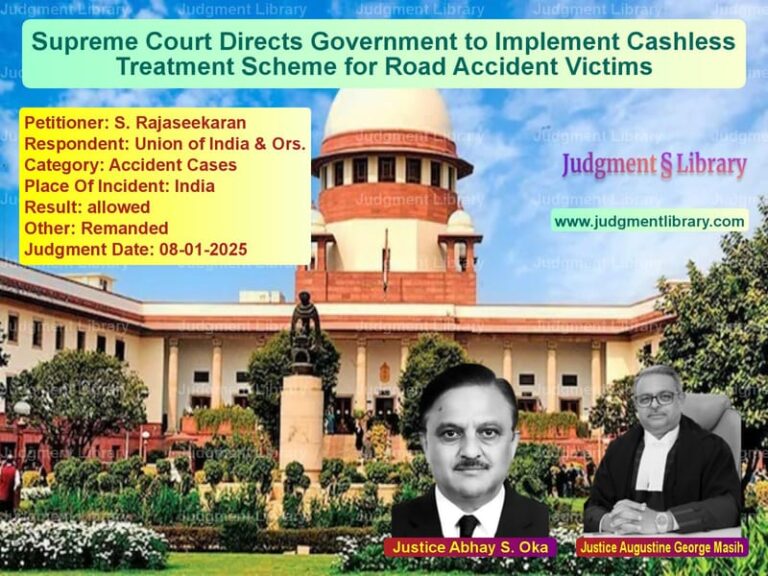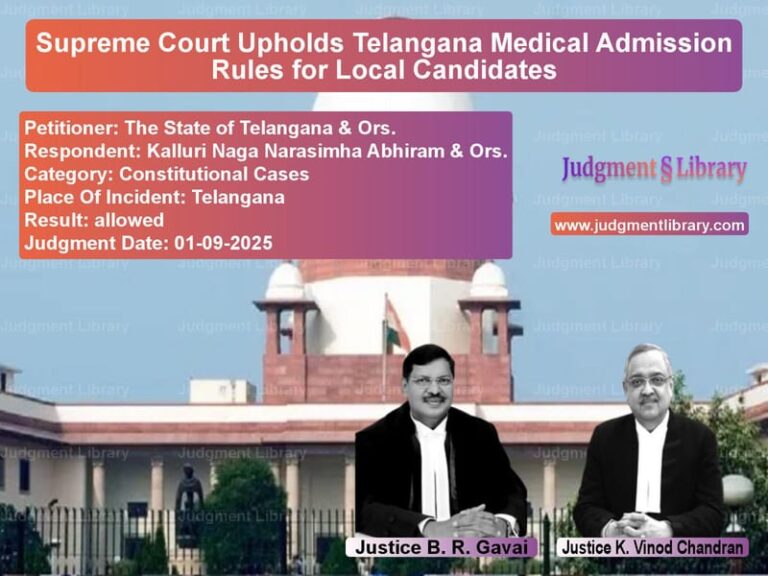Supreme Court Converts Murder Conviction to Culpable Homicide in 39-Year-Old Land Dispute Case
In a significant judgment that distinguishes between murder and culpable homicide, the Supreme Court has converted the conviction of four accused persons from murder to culpable homicide not amounting to murder in a 39-year-old case stemming from a land dispute that claimed three lives. The case involved Raghav Prashad and three others who had been convicted for the 1986 murders of three family members during a property measurement dispute in Uttar Pradesh.
The tragic incident dates back to August 6, 1986, when complainant Ram Gopal (PW-1) along with his father Ram Antar, uncles Namo Shankar and Girija Shankar, and two other persons had arrived at Baruahaar Ghat for measuring agricultural fields for partition. According to the prosecution, the accused persons – Raghav Prashad (owner of adjacent land), Prem Shankar (brother of Raghav Prashad), Dayanidhi (cousin brother), and Ram Naresh (father-in-law of Prem Shankar) – were hiding at the location and suddenly emerged when the measurement party arrived.
The prosecution case stated that an altercation ensued over the measurement of agricultural fields, which quickly escalated into violence. The accused persons allegedly attacked the victims with various weapons including pike, sticks, and spear. Following the attack, the complainant along with the injured victims went to the Raipura police station in a bullock cart driven by one Kandhai Lal, and FIR No. 53/1986 was registered at 9:30 AM initially under Sections 307 and 308 read with Section 34 of the Indian Penal Code.
The injured persons were subsequently sent to Karvi Hospital, but the situation turned fatal when Ram Antar and Namo Shankar succumbed to their injuries on the same day at Karvi Hospital. The third victim, Girija Shankar, also died while being shifted to another hospital in Allahabad. Consequently, the charges were enhanced to Section 302 IPC (murder).
The accused appellants were arrested on August 12, 1986, and after trial, the Additional District and Sessions Judge, Karvi (Banda) convicted them under Section 302 read with Section 34 of IPC on November 8, 1989. They were sentenced to rigorous imprisonment for life along with a fine of Rs. 6,000. The Allahabad High Court upheld this conviction and sentence in its judgment dated July 4, 2013, leading to the present appeal before the Supreme Court.
Before the Supreme Court, Shri Raj Kumar Yadav, learned counsel for the appellants, made two primary submissions. He argued that “the prosecution’s case is solely based on the evidence of PW-1” and that “PW-1 is a related witness and as such, the conviction cannot rest solely on the basis of his evidence.” Additionally, he contended that “the offence committed by the accused appellants would not fall under Section 302 IPC and at the most, the accused appellants could be convicted for a lesser offence.”
Opposing the appeal, Shri Akshay Amritanshu, the learned counsel appearing for the State, vehemently argued that “the appellants have committed the brutal murder of three persons.” He further submitted that “the testimony of PW-1 is supported by medical evidence and as such, no interference by this Court would be warranted.”
The Supreme Court bench comprising Chief Justice B.R. Gavai and Justice K. Vinod Chandran carefully examined the evidence and legal aspects of the case. The court noted that the prosecution case primarily rested on the testimony of PW-1, who was the son of deceased Ram Antar and nephew of the other two deceased persons. PW-1 had deposed about the dispute over measurement of agricultural fields between his father and accused Raghav Prashad, and described how the four accused persons emerged from hiding and attacked the victims with weapons.
However, the court made a crucial observation about the nature of the attack: “The perusal of the evidence of PW-1 would reveal that even though the accused appellants were having sharp weapons (pike, spear, etc.), they had only used the blunt side of the said weapons.” This finding became significant in determining the intention behind the attack.
The court further noted that “the medical evidence would also show that all the three deceased persons had lacerated and confused wounds only and there were no incised wounds.” This medical evidence corroborated PW-1’s testimony that the accused had used the blunt sides of their weapons rather than the sharp edges.
The Supreme Court agreed with the concurrent findings of the Trial Court and High Court regarding the identity of the perpetrators, stating: “In view of the evidence of PW-1, we do not find any reason to disagree with the concurrent findings of fact recorded by the Trial Court and the High Court that it was the accused appellants who caused the death of Ram Shankar, Namo Shankar and Girija Shankar.”
However, the court then addressed the crucial legal question: “the question that arises for our consideration is as to whether the conviction under Section 302 IPC would be tenable or whether the accused are liable to be convicted for a lesser offence.”
In its analysis, the Supreme Court made a significant distinction between murder and culpable homicide not amounting to murder. The court observed: “We find that though the accused persons could be said to have the knowledge that the injuries would cause death of the deceased, there is no material on record to show that they had the intention to kill them.”
The court further noted that “PW-1 had himself deposed that there was prior enmity between the Appellant No. 1- Raghav Prashad and deceased Ram Antar over the measurement of agricultural fields.” This context of a sudden fight arising from a long-standing dispute, combined with the manner of attack using blunt sides of weapons, led the court to conclude that the case fell under Section 304 Part I of IPC rather than Section 302.
The Supreme Court concluded: “We, therefore, find that in the facts of the present case, the conviction under Section 302 IPC would not be tenable and is liable to be converted to one under Section 304 Part I of IPC. We are, therefore, inclined to partly allow the appeal.”
In its final order, the court converted the conviction from Section 302 to Section 304 Part I of IPC and noted that the accused appellants had already undergone more than 12 years of imprisonment. The court held that “the sentence already undergone by them would subserve the interest of justice” and directed their release forthwith, provided they were not required in any other case.
This judgment highlights the important legal distinction between murder and culpable homicide in Indian criminal law. While murder requires intention to cause death, culpable homicide not amounting to murder applies when the accused has knowledge that their act is likely to cause death but without the specific intention to kill. The Supreme Court’s decision demonstrates how courts carefully examine the circumstances of each case, including the nature of weapons used, manner of attack, and context of the dispute, to determine the appropriate legal classification of the offence.
Petitioner Name: Raghav Prashad and Others.Respondent Name: State of U.P..Judgment By: Justice B.R. Gavai, Justice K. Vinod Chandran.Place Of Incident: Karvi, Banda District, Uttar Pradesh.Judgment Date: 26-09-2025.Result: partially allowed.
Don’t miss out on the full details! Download the complete judgment in PDF format below and gain valuable insights instantly!
Download Judgment: raghav-prashad-and-o-vs-state-of-u.p.-supreme-court-of-india-judgment-dated-26-09-2025.pdf
Directly Download Judgment: Directly download this Judgment
See all petitions in Murder Cases
See all petitions in Attempt to Murder Cases
See all petitions in Other Cases
See all petitions in Judgment by B R Gavai
See all petitions in Judgment by K. Vinod Chandran
See all petitions in partially allowed
See all petitions in Modified
See all petitions in supreme court of India judgments September 2025
See all petitions in 2025 judgments
See all posts in Criminal Cases Category
See all allowed petitions in Criminal Cases Category
See all Dismissed petitions in Criminal Cases Category
See all partially allowed petitions in Criminal Cases Category







